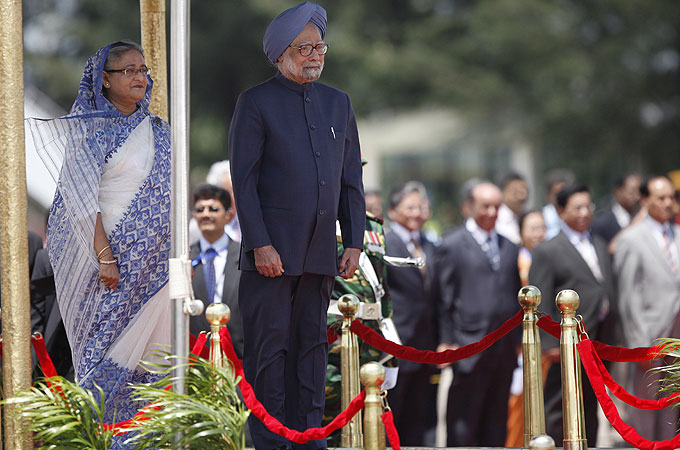India’s PM begins key visit to Bangladesh
Manmohan Singh’s trip aimed at mending ties with eastern neighbour, but water sharing and transit deals remain unlikely.

 |
| Manmohan Singh and his Bangladeshi counterpart Sheikh Hasina review an honour guard in Dhaka [Reuters] |
Manmohan Singh, the Indian prime minister, has arrived in Dhaka, the Bangladeshi capital, on a high-profile visit aimed at mending often fractious relations with his country’s eastern neighbour.
“We attach the highest importance to further developing and strengthening our relations with Bangladesh,” Singh said in a statement on Tuesday issued before his trip.
“Our partnership with Bangladesh is important for the stability and prosperity of our own northeast region.”
However, breakthroughs on key disputes, including the sharing of water from rivers and transit rights, look unlikely during the two-day visit.
Officials in both countries said a deal to share water from two rivers, the Teesta and the Feni, that flow via India into Bangladesh may not be signed during Singh’s visit because the government of the Indian state of West Bengal state refused to accept the agreement.
Ranjan Mathai, India’s foreign secretary, said on Tuesday that the government would go ahead with the Teesta river deal only if it was acceptable to the state government.
“In our federal scheme, any agreement we do will have to be acceptable to the state government … won’t get into details on where we are now,” Mathai said.
Dipu Moni, the Bangladeshi foreign minister, said late on Monday that India had not ruled out the signing of an agreement. “We are still hopeful,” she said.
But a Bangladesh foreign ministry official told the Reuters news agency on Tuesday the river deal “looks very unlikely” during Singh’s visit.
Transit rights
There was also not expected to be agreement on an Indian request for transit rights through Bangladesh for India’s land-locked northeastern states, because terms and conditions had not been finalised, the official said.
However, Bangladesh would allow India to use its Chittagong and Mongla ports from next year to supply the states, Abul Maal Abdul Muhith, the Bangladeshi finance minister, said.
Begum Khaleda Zia, the Bangladeshi opposition leader, is against giving India a “corridor” to the states and the right to use the ports because she feels it would give India “an upper hand” over Bangladesh.
The two sides are expected to sign a key agreement to definitively demarcate their 4,000km shared border.
As part of the deal, they will swap scores of enclaves – tiny, landlocked communities in each other’s territory -in which more than 50,000 people live, cut off from their respective governments and without access to even basic services.
Singh is due to meet Khaleda on Wednesday, while he will hold talks with the Bangladeshi PM a day before.
Growing trade
Ties between the two countries have suffered over recent years because of Indian worries that religious extremists were using Bangladesh as a base.
Nevertheless, relations have improved since the traditionally pro-Indian Awami League party, led by Prime Minister Sheikh Hasina, acted against anti-India extremist groups.
|
India and Bangladesh discuss ‘pasha’ enclaves |
Bilateral trade has grown steadily but remains heavily in India’s favour, with the gap widening, causing concern in Bangladesh where businesses are asking for the removal of both tariff and non-tariff barriers.
Last year, India gave Bangladesh a billion-dollar soft loan, the biggest credit package New Delhi has ever earmarked for any nation.
The visit comes after an embarrassing slip-up in June, when Singh, in an interaction with senior journalists, claimed that many Bangladeshis were “very anti-Indian”.
Singh’s visit, which ends on Wednesday, is the first by an Indian prime minister to Bangladesh in 12 years.
The two countries have struggled to establish good ties ever since India helped its eastern neighbour gain independence from Pakistan in 1971.